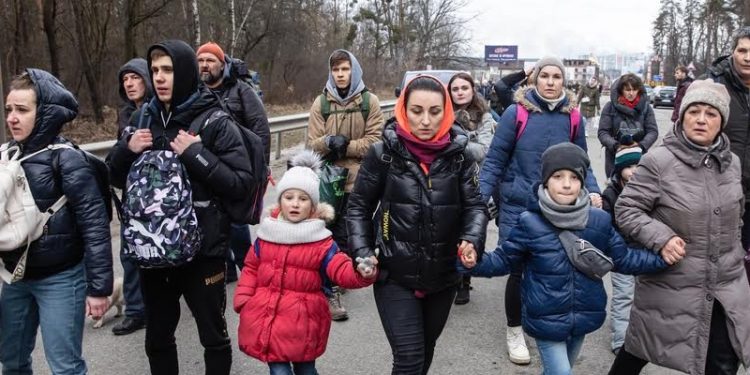According to the United Nations High Commissioner for refuges, there are currently 100 million people who have been forcible displaced by war or natural disaster worldwide.
The is 100 million people who have been forced to leave their homes, often with nothing more than the clothes on their back, who have to seek shelter and food elsewhere – often being forced to cross country borders and experience mistreatment, poor conditions and potential threat to life.
Two thirds of these people come from just five countries – Syria, Venezuela, Afghanistan, South Sudan and Myanmar.
Counting the cost of the Pakistan floods
What these figures do not take into account is the devastation wreaked by the flooding in Pakistan. Estimates indicate that over 33 million people have been affected by the floods, losing homes and livelihoods, and finding themselves at risk of disease and death. The rawness of these recent events is why a flood appeal is so important.

Increasing exposure to risk
Displaced communities can have devastating effects that are multi layered and far reaching for both the refugees and the host countries too.
Losing the security of their homes can place people into positions of vulnerability and risk. Women and children particularly are open to exploitation and potential trafficking, particularly in area of conflict and persecution, where forcibly displaced communities are vilified and ‘punished’.
Being in such vulnerable positions, they are vulnerable to the machinations of international trafficking organisations who ‘sell’ the opportunity to travel to settled communities in countries that will take care of them. Unfortunately these illegal and dangerous gangs will often charge thousands with no guarantees, and often redirect more vulnerable women and children to more malignant forces who will take advantage of their defenceless position.
The toll on mental health
The social consequences of displacement include: unemployment, poor integration, lack of security, food and water poverty, discrimination and racism, disruption to education and the breaking up of the family unit.
This leads to the rapid onset of emotional distress that manifests though severe depression and anxiety, and stress, which in turn affect an individual’s physical wellbeing. Increased stress, poor nutrition and lack of sleep can significantly compromise the immune system making people more susceptible to illness and disease in environments where poor sanitation is often an issue.
Post traumatic stress
A common denominator among refugees is the fact that they are often escaping from tragedy or conflict and have potentially witnessed some distressing events. Feeling from such devastation does not give them time to process what they have witnessed properly, and they are left having to survive in alien environments. When the initial shock wears off, refugees are left to deal with the effects of post traumatic stress, which manifest as overwhelming feelings of anxiety and sadness, hopelessness, insomnia, fatigue, irritability and anger. It can also come through as physical aches and pains. The complete lack of a sense of control over their own destiny can lead to suicidal tendencies among many refugees.
While crisis management to help the plight of refugees feeling from both natural disasters and man-made conflicts ensures that they have success to the most basic of necessities – food, shelter, warmth and water – more effort needs to be put into helping them overcome their experiences psychologically. T
his will not only help them on an individual basis, but will also ensure that they are in a stronger position emotionally (and ultimately physically) to start rebuilding their lives more quickly and effectively.
With the prevalence of women and children among those 100 million plus people who have been displaced, greater emphasis needs to be placed on regenerating and rebuilding the future for the good of them all.


